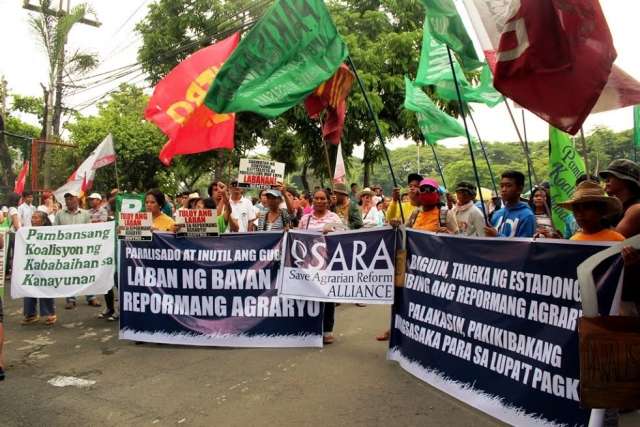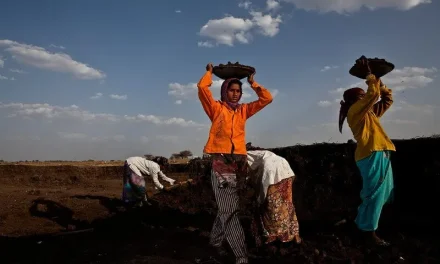PRESS RELEASE
P-Noy’s CARP/ER Legacy: rural unrest, unfinished agrarian reform, land grabbing, and landlord impunity— multisectoral groups
On the eve of the Comprehensive Agrarian Reform Program’s 27th anniversary, around 450 farmers, women, labor, youth, and agrarian reform activists converged at the Department of Agrarian Reform (DAR) to collectively exact accountability from the Aquino administration’s mangling of the nationwide agrarian reform program. With chants loud and signs high, protesters from the Save Agrarian Reform Alliance (SARA), Kaisahan ng Maliliit na Magsasaka (KMM), KATARUNGAN, Pambansang Kaisahan ng Magbubukid sa Pilipinas (PKMP), PARAGOS-Pilipinas, Pambansang Kongreso ng mga Kababaihan sa Kanayunan (PKKK), Alliance of Progressive Labor-SENTRO, World March of Women-Pilipinas, Ateneans for Agrarian Reform Movement (AFARM), Foodfirst Information and Action Network-Philippines (FIAN), Laban ng mga Iskolar para sa Repormang Agraryo (UP LIKHA), Peoples’ Development Institute, and Focus on the Global South ensured that their critical messages were heard outside the DAR office:
“TULOY ANG LABAN SA REPORMANG AGRARYO, KAHIT PINALPAK NG GOBYERNO!”
“PALAWAKIN ANG MGA LABAN PARA SA HUSTISYA SA LUPA!”
“KAUNLARAN NG SAKA!” “REPORMANG AGRARYO, LABAN NG BAYAN!”
Wearing white as if in a funeral, the group symbolically padlocked the inutile Department of Agrarian Reform while holding a program in front of it. Farmers from Porac and Mabalacat, Pampanga, Bulacan, Bataan, Rizal, and Hacienda Matias, Quezon –considered as agrarian hotspots in the country— lamented the systematic harassments, violations of human rights, and extrajudicial killings of farmers, farmworkers, and rural women fighting for their lands in the face of the government’s failure to protect their rights. With the Philippines’ anti-agriculture and anti-small farm development policies, landlords, agribusiness and corporations in collusion with corrupt DAR and other CARP-implementing agencies’ officials exploited the loopholes in CARP/ER (CARP and CARP Extension with Reforms) to serve the former’s interests.
Reinforcing its legal-technical approach on coverage, the government succeeded in placing in limbo 76,000 hectares of untitled privately claimed agricultural lands, and may no longer be considered as part of the balance of CARP/ER.
Farmers in Yolanda-affected municipalities such as Leyte continue to suffer unresolved problems of installations, displacement of tenants in coconut areas, and threats of land conversion to other uses.
According to the groups, incidences of land grabbing, landlord impunity, and circumventions of the law marked the 27 years of existence of CARP/ER. Wherever and whenever CARP worked, it was because of the incremental efforts, critical engagement and rights-claiming of rural social movements from below coupled with the support from other sectors from above to effectively implement the program, the protestors argued.
The groups also condemn the deliberate counter-reform tactics of the Visayan bloc, a group of landlords at the House of Representatives, that inserted anti-farmer and anti-agrarian reform provisions in House Bill 4296, which aims to extend the issuance of notices of coverage or NOCs, the initiatory step for the land acquisition and distribution process. Such provisions include exemptions of rainfed or non-irrigable lands close to national highways, increasing the retention limits for landlords and their heirs, and changing the reckoning date for retention rights of legal heirs of deceased landowners over aggregate individual landholdings from June 10, 1988 to January 1, 2015 instead.
Clearly, the landed elites in the House of Representatives are protecting their own interests—another roadblock in the full implementation of CARP. Another barrier to rural development. Another obstruction of social justice.
The future of CARP/ER appears grim: substantial headway towards the full completion of the Philippine agrarian reform program has yet to take place, five years after it was extended and reformed by the CARPER Act. This fact has been firmly borne out by how the CARP record of the Aquino government’s DAR and other CARP-implementing agencies has remained at dismal and depressing levels. That reality has been the outgrowth of a sustained neglect and incompetence of the current administration, an indecisive and technicality-oriented DAR leadership, an inhospitable neoliberal policy environment, and a President who cannot go beyond his class interests.
Enough is enough!
The groups vowed to continue and intensify the fight for agrarian reform and social justice.
The movement for agrarian reform and rural development will continue to grow – as farmers, workers, women, and the youth look for other alternative avenues in the fight for equity and justice. Among them include:
- a CARPER Audit that would assess the performance of DAR and other CARP-implementing agencies in the last five years and would validate it on the ground;
- sustained struggles to secure of land tenure for small, landless farmers, farmworkers and rural women amid land grabbing, cancellation of land titles or Certificate of Land Ownership Awards (CLOA), illegal reclassification and land use conversions;
- promotion of alternative models of agricultural production for small farmers and food producers, of food sovereignty and sustainability of the environment;
- protection of the rights of workers in the food industry, commercial farms, and plantations;
- campaigns for social protection, rural development, and industrialization; and
- national youth alliance for agrarian reform and rural development and “balik-farm programs”.
The groups stressed that defending and protecting agricultural lands will not only secure the land rights and lives of farmers and food producers, it will secure the nation’s food needs. Agrarian reform is everybody’s fight.
Contacts:
Mary Ann Manahan, SARA Secretariat/Focus on the Global South, +639062983206
Jean Enriquez, World March of Women, +639153178018




![[AEPF] FIND AND PUNISH ANOUSA’S ATTACKERS; END VIOLENCE AND IMPUNITY!](https://focusweb.org/wp-content/uploads/2023/05/Photo-C-e1683192637583-440x264.jpeg)





